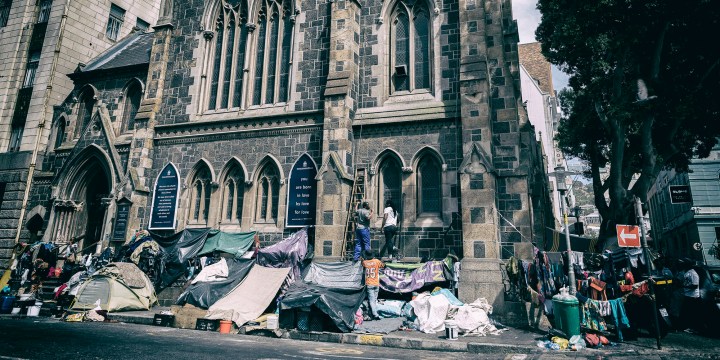REFUGEE CRISIS
‘Intimidation’ among Cape Town migrants discourages reintegration efforts

Home Affairs Minister Aaron Motsoaledi warned that protesting migrants must either reintegrate into South African society or return to their countries of origin, but some refugees are being threatened if they accept the option to stay, says SA Human Rights Commissioner Chris Nissen.
South African Human Rights Commissioner Chris Nissen says there’s ongoing intimidation among displaced migrants in Cape Town to force them to refuse offers for reintegration into local communities.
Nissen spoke at a Home Affairs Parliamentary Committee meeting where the department, alongside the SA Human Rights Commission (SAHRC), the City of Cape Town and the United Nations High Commissioner for Refugees (UNHCR) briefed the committee on Tuesday 10 March on protests involving the refugees in Cape Town and Pretoria.
“Messages are still being sent via social media to say refugees must not move because they are still going to Canada.”
The City’s executive director for Safety and Security Richard Bosman said there was a “hardline attitude” from a small group of protesters who still want to be resettled.
Bosman claimed that “at least 50 families” approached the City, asking for assistance to be reintegrated back into their communities, but stayed with the group of protesters after facing intimidation.
Home Affairs Minister Aaron Motsoaledi, said, however, that the option for reintegration had been rejected repeatedly by the refugees, during engagements on how to resolve the crisis.
The refugees, who had embarked on a sit-in protest outside the UNHCR offices, demanding resettlement to another country, had been living in and around the Central Methodist Mission church on Greenmarket Square for four months after being forcibly removed from the Waldorf Arcade on 30 October 2019.
The City of Cape Town was granted a court order in February to enforce its by-laws and on 1 March the refugees were peacefully moved from Greenmarket Square.
Some have opted to squat in the area around the District Six Museum in the Cape Town CBD. Others escaped to inside the church, where according to Nissen, roughly 250 to 300 refugees still reside. The onus is now on the church and its leader, Reverend Alan Storey, to have them vacate the building.
Motsoaledi warned that protesting migrants must either reintegrate into South African society or be deported to their countries of origin.
“In various meetings of state organs and other stakeholders, convened by the SAHRC, a consensus was reached that the only way forward is reintegration of the protesters back to communities in which they were staying before embarking on the protest action. Indeed, some have already gone back to such communities,” said Motsoaledi.
Refugees were demanding group resettlement, to another “safe” country, citing fears of xenophobic violence. But according to UNHCR policies, resettlement can be done only on a case by case basis and is also contingent on whether countries are willing to accept refugees.
Motsoaledi said countries such as Canada were not willing to welcome the group.
Miranda Gaanderse, the Head of Field Office at the UNHCR, told the committee that local integration, repatriation and resettlement were the three durable solutions available to refugees.
Resettlement is only possible for a small percentage of refugees worldwide, Gaanderse explained, and is the final option after all avenues have been exhausted.
Significantly, repatriation is only on a voluntary basis and is dependent on whether it is safe to return to the country of origin.
South Africa is also a signatory to the 1951 refugee convention and its 1967 Protocol Relating to the Status of Refugees which contains the principle of non-refoulement. Non-refoulement protects legitimate refugees from being forced to return to their countries of origin if it puts them in danger.
Motsoaledi said after the Department of Home Affairs concluded its status determination and verification exercise (as ordered by the courts, before the by-law could be enforced), 780 people were verified, of whom roughly three quarters were documented asylum seekers or have refugee status.
Those who were undocumented should have been deported, the minister said, but indicated that they wanted to apply for asylum and have been given two weeks to report to a Refugee Reception Office to begin the process.
Motsoaledi also chastised the City of Cape Town for not enforcing its by-laws and shifting the blame on to Home Affairs during court proceedings for the interdict application:
“The Department of Home Affairs hopes that the judgment serves as a wake-up call to the City of Cape Town to vigorously enforce its by-laws and protect the rights of the inhabitants, particularly the business community that has suffered so much, since the beginning of this saga.”
Motsoaledi also slammed the conduct of the leaders of the protesting group, Jean-Pierre Balous and Papy Sukami, while quoting passages from the court judgment which said the pair “misled” protesters and created an “illusionary self-governing territory”.
“Refugees have a right to be protected, but they don’t have a right to breach by-laws or any other laws of the country.”
Balous was involved in a scuffle in the Cape Town Magistrate’s Court on 6 March, when police tried to arrest him for charges laid by Nissen. Balous had levelled death threats against Nissen, but was appearing in court for separate charges of assault. Home Affairs threatened to deport him after the incident.
The committee has been given a month to come up with a plan to resolve the crisis. DM



















 Become an Insider
Become an Insider